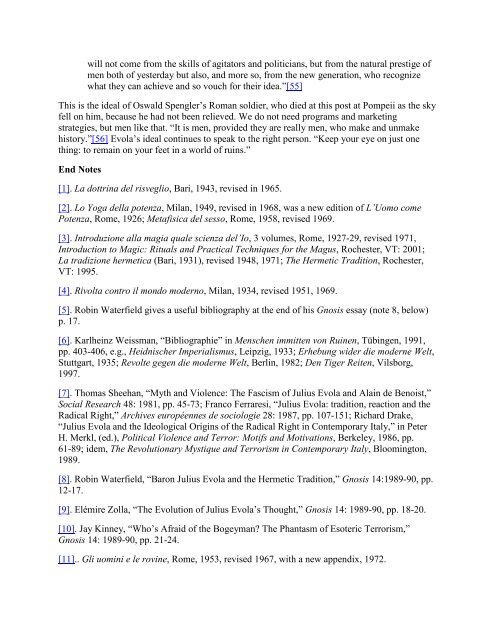Julius Evola On Tradition And The Right.pdf - WNLibrary
Julius Evola On Tradition And The Right.pdf - WNLibrary
Julius Evola On Tradition And The Right.pdf - WNLibrary
You also want an ePaper? Increase the reach of your titles
YUMPU automatically turns print PDFs into web optimized ePapers that Google loves.
will not come from the skills of agitators and politicians, but from the natural prestige of<br />
men both of yesterday but also, and more so, from the new generation, who recognize<br />
what they can achieve and so vouch for their idea.”[55]<br />
This is the ideal of Oswald Spengler’s Roman soldier, who died at this post at Pompeii as the sky<br />
fell on him, because he had not been relieved. We do not need programs and marketing<br />
strategies, but men like that. “It is men, provided they are really men, who make and unmake<br />
history.”[56] <strong>Evola</strong>’s ideal continues to speak to the right person. “Keep your eye on just one<br />
thing: to remain on your feet in a world of ruins.”<br />
End Notes<br />
[1]. La dottrina del risveglio, Bari, 1943, revised in 1965.<br />
[2]. Lo Yoga della potenza, Milan, 1949, revised in 1968, was a new edition of L’Uomo come<br />
Potenza, Rome, 1926; Metafisica del sesso, Rome, 1958, revised 1969.<br />
[3]. Introduzione alla magia quale scienza del’Io, 3 volumes, Rome, 1927-29, revised 1971,<br />
Introduction to Magic: Rituals and Practical Techniques for the Magus, Rochester, VT: 2001;<br />
La tradizione hermetica (Bari, 1931), revised 1948, 1971; <strong>The</strong> Hermetic <strong>Tradition</strong>, Rochester,<br />
VT: 1995.<br />
[4]. Rivolta contro il mondo moderno, Milan, 1934, revised 1951, 1969.<br />
[5]. Robin Waterfield gives a useful bibliography at the end of his Gnosis essay (note 8, below)<br />
p. 17.<br />
[6]. Karlheinz Weissman, “Bibliographie” in Menschen immitten von Ruinen, Tübingen, 1991,<br />
pp. 403-406, e.g., Heidnischer Imperialismus, Leipzig, 1933; Erhebung wider die moderne Welt,<br />
Stuttgart, 1935; Revolte gegen die moderne Welt, Berlin, 1982; Den Tiger Reiten, Vilsborg,<br />
1997.<br />
[7]. Thomas Sheehan, “Myth and Violence: <strong>The</strong> Fascism of <strong>Julius</strong> <strong>Evola</strong> and Alain de Benoist,”<br />
Social Research 48: 1981, pp. 45-73; Franco Ferraresi, “<strong>Julius</strong> <strong>Evola</strong>: tradition, reaction and the<br />
Radical <strong>Right</strong>,” Archives européennes de sociologie 28: 1987, pp. 107-151; Richard Drake,<br />
“<strong>Julius</strong> <strong>Evola</strong> and the Ideological Origins of the Radical <strong>Right</strong> in Contemporary Italy,” in Peter<br />
H. Merkl, (ed.), Political Violence and Terror: Motifs and Motivations, Berkeley, 1986, pp.<br />
61-89; idem, <strong>The</strong> Revolutionary Mystique and Terrorism in Contemporary Italy, Bloomington,<br />
1989.<br />
[8]. Robin Waterfield, “Baron <strong>Julius</strong> <strong>Evola</strong> and the Hermetic <strong>Tradition</strong>,” Gnosis 14:1989-90, pp.<br />
12-17.<br />
[9]. Elémire Zolla, “<strong>The</strong> Evolution of <strong>Julius</strong> <strong>Evola</strong>’s Thought,” Gnosis 14: 1989-90, pp. 18-20.<br />
[10]. Jay Kinney, “Who’s Afraid of the Bogeyman? <strong>The</strong> Phantasm of Esoteric Terrorism,”<br />
Gnosis 14: 1989-90, pp. 21-24.<br />
[11].. Gli uomini e le rovine, Rome, 1953, revised 1967, with a new appendix, 1972.
















